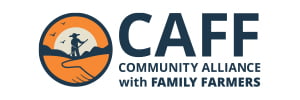Exploring open-source technologies for the small farm.
The Gathering for Open Agricultural Technology (GOAT) has introduced the Small Farm Tech Hub to available open-source agricultural tools and we’d like to help spread the word on these available resources to our small farm community! We’d love to hear of your own experiences using any of these tools so that we can share with others. Please let us know if you would like to get more involved in any of these projects as we’ll be hosting tech events throughout the year. Contact us at techhub[a]caff.org

Open-Source Ag Tools to Explore
LiteFarm: Web-based application for farm management, planning, task management, documents, and certification doc creation
- Web: https://www.litefarm.org/
- https://app.litefarm.org/, mini-guides @ https://www.youtube.com/channel/UChHGuLg3o50LuNHGt7Qup9A
Open Food Network: Marketplace software for networked ecommerce built for food hubs, farmers markets, and producers who want to sell, aggregate, and distribute local food.
- Web: info: https://about.openfoodnetwork.net app:https://openfoodnetwork.net
- Contact: hello-usa@openfooodnetwork.net
farmOS: Web-based application for farm management, planning, and record keeping
- Web: https://farmOS.org
- Forum: https://farmOS.discourse.group
- Demo: https://farmos-demo.rootedsolutions.io/ (lasts 24 hours) / https://farmier.com/signup (30-day trial w/ option to keep)
- More: https://farmOS.org/guide/ + https://farmos.org/blog/2022/getting-started
Farmers Coffee Shop: The Farmers Coffee Shop is a visual benchmarking tool that allows you to see your lab results and anonymously compare them against others.
- Website: Farmcoffeeshop.com
SurveyStack: This is a robust research tool for anyone that will be collecting data from several groups or farms for an extended period of time. Our survey tool is flexible with many options tailored for working with a diverse group while supporting research admins to easily manage their surveys and group.
- Website: Surveystack.io
SoilStack: This tool helps those testing soil samples to make the best decision when deciding where on their property to test their soil. We use publicly available data and databases that are often time consuming to navigate to determine the most strategic locations to test your soil.
- Website: soilstack.io
OpenTEAM: OpenTEAM, a project of Wolfe’s Neck Center for Agriculture and the Environment, is a community of organizations and land stewards co-developing a suite of agricultural technologies that work together to make data collection, sharing, and sovereignty the most accessible for farmers and ranchers, ultimately with the goal to advance climate-smart agriculture.
- Website: https://openteam.community/
Agricultural Informatics Lab @ Purdue University: At the Agricultural Informatics Lab, we conduct community-engaged design research and technology development to improve resilience in food and agricultural systems. Each of our projects includes: a partnership with domain experts and communities (e.g., agronomy researchers, farmers, food hub coordinators), a mix of undergraduate students, graduate students, senior personnel, and interdisciplinary faculty. We provide design research support for GOAT and community partner. Contact: aginformaticslab@gmail.com http://aginformaticslab.org
About GOAT:
The technologies that produce our food and the data about our food system should be public, and enable control by the farms and farmers that produce it. Together, we can collectively address the problems which prevent the creation of advanced, high quality open technology and its adoption.
Problem
Information about our food system should be public or easy-to-share. Unfortunately, that is often not the case. Food is currently produced by a mix of private and public entities, and information about our food system can be opaque, hard-to-find, or proprietary and farmers may have limited control of the on-farm data they generate or ability to improve the tools they use.
Agricultural startups are often venture-funded, with interest veering toward capitalizing on farm data. Controlling such data, not just machines or sensors, is considered the most valuable game in town (at least in the short term). Closed data ecosystems hinder our ability to produce food equitably and sustainably and support farm level decision support.
Fortunately, there is also significant interest in creating open source hardware and software to increase transparency in the food chain, allow for data sharing among groups, and engage the public and make the benefits of shared data available to all. Though the number of projects is growing, they tend to be small, isolated within universities or small companies, and disconnected from one another. The result is duplication of efforts, hard to find projects, and disconnected parts producing incompatible data. The lack of coordination means that as technology rapidly changes, closed-source companies are locking up the machinery, sensors, data, and varieties of the future.
Learn more by visiting https://goatech.org/


